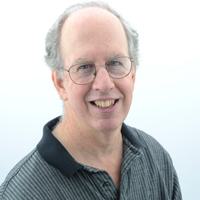
Frederic Shultz
Professor Emeritus of Mathematics
Research involves operator algebras, and quantum information theory, both of which involve linear algebra and functional analysis.
A simple example of an operator algebra is the set of square matrices of a given size, but the algebras of most interest are often infinite dimensional. The study of operator algebras was originally motivated by an attempt to understand the foundations of quantum mechanics, in a long tradition of mathematics being created in an effort to solve scientific questions. I’ve always had a great interest in quantum mechanics, ever since taking a course from the physicist Richard Feynman, who was the most inspirational teacher I ever encountered. There are applications of operator algebras in many fields, including quantum mechanics, dynamical systems, group representations, tilings, and knot theory.
Recently I’ve been working in the field of quantum information theory. This includes quantum computing, which has the potential to create computers that are far faster than those in use today, at least for certain kinds of calculations. Interest in this field exploded starting in the 1990's, and it has participants from many fields besides mathematics, including physics and computer science. Mathematical questions involving linear algebra play an essential role, and there are interesting connections with operator algebras.
Mathematics is frequently a social enterprise, and I’ve often worked in collaboration. For example, I’ve written research monographs with Erik Alfsen (University of Oslo), e.g., “State spaces of operator algebras,” which is probably the part of my work which is the best known. I’ve also written a software/book combination, Joy of Mathematica, with Alan Shuchat. In a different kind of collaboration, I’ve particularly enjoyed the chance to team teach courses when they are being newly developed and taught at Wellesley, including Elementary Statistics and Mathematics for the Sciences I. My research involves material from Linear Algebra, Analysis, and Abstract Algebra, but I also enjoy teaching courses that are in quite different areas, such as Combinatorics and Graph Theory and Introduction to Chaotic Dynamical Systems.
One of the most enjoyable aspects of Wellesley is the chance to discuss the craft of teaching with others. In graduate school I participated in the development of a calculus course taught by what would now be called inquiry based learning, related to the discovery method or Moore method for teaching mathematics, and have enjoyed the courses I’ve taught in that style at Wellesley. I like to experiment with different teaching methods, so that even though I’ve taught calculus many times, the experience is still new.
One aspect of Wellesley that I value is faculty governance. While time consuming, this is also enjoyable. I invested a considerable amount of time and energy as chair of the Budget Advisory Committee, and as co-chair of the Plans and Priorities Committee (a long range planning committee of faculty and trustees), and as chair of the Advisory Committee on Library and Technology Policy.
I’m an avid golfer. I thank my wife for her patience the hundreds of times that she has heard that at last I’ve found the secret to a successful golf swing. I’m an enthusiastic Red Sox and Patriots fan, and enjoy tennis, table tennis, pool, skiing, chess, go, and reading about economics and politics. I’m married with three children and two grandchildren.